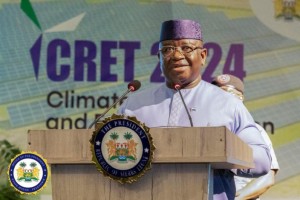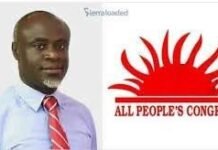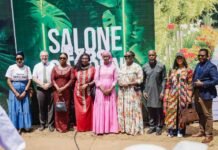By Amin Kef (Ranger)
President Dr. Julius Maada Bio inaugurated Sierra Leone’s ambitious Energy Transition and Green Growth Plan at the second National Climate Resilience and Energy Transition Dialogue held on November 4, 2024, at the Freetown International Conference Center. Organized by the Presidential Initiative on Climate Change, Renewable Energy and Food Security (PI-CREF), the event highlighted Sierra Leone’s commitment to a sustainable energy future and a greener economy.
In his address, President Bio outlined the comprehensive approach of the new plan, which encompasses key economic sectors such as energy, agriculture, transport and mining. The plan’s analysis is set to explore various scenarios to identify the most cost-effective strategies to meet Sierra Leone’s future energy needs.
“At the second National Climate Resilience and Energy Transition Dialogue, themed: ‘From Commitments to Action for our People and Communities,’ I reaffirmed my Government’s commitment to a fair, inclusive energy transition and green growth,” stated President Bio. He emphasized that the transition plan will uplift communities, protect workers and enable industries to adapt to the demands of the new energy landscape.
President Bio also expressed gratitude to the Sustainable Energy for All (SEFA) program and various partners for their support in developing Sierra Leone’s first-ever Energy Transition and Investment Plan (ETIP). He noted that this landmark plan aligns with the Government’s vision for a sustainable, affordable and inclusive energy transition.
During the opening remarks, Deputy Minister 1 of the Ministry of Energy, Eldred Taylor, highlighted the international collaboration present at the dialogue, underscoring the global support in advancing a sustainable energy future for Sierra Leone.
Fredrick Appiah, UNDP Country Representative, commended Sierra Leone’s progress since the initiative’s inception, pledging the UNDP’s continued support for green industrialization efforts. Fredrick Appiah encouraged additional international engagement, noting that those efforts are vital not only for the energy sector but for overall economic growth.
The first day of the Climate Resilience and Energy Transition (CRET2024) conference concluded on a high note, with over $115 million committed to sustainable initiatives. Among the notable pledges was a $105 million livestock program from the International Fund for Agricultural Development (IFAD), which will be formalized on November 6, advancing IFAD’s commitment made at the Vienna Roundtable.
Denmark announced a €3 million contribution for decentralized energy solutions as part of the Africa Power Sector Reform Agenda (APRA) and committed an additional $5 million toward a new clean cooking program under the Global Energy and Climate Change Organization (GeCCO). Moreover, technical assistance for reforms at the Energy Distribution and Supply Authority (EDSA) was announced, supported by Power Africa, the Danish Energy Agency and the Foreign, Commonwealth & Development Office (FCDO).
The German Embassy further reinforced international collaboration by pledging direct support to PI-CREF, reflecting global alignment with Sierra Leone’s green ambitions.
In another milestone, the World Bank revealed that Sierra Leone will host the regional Decentralized Energy Program for Africa conference, known as DARES, which is expected to unlock significant funding for mini-grids and advance rural electrification across the country.
The dialogue’s achievements reflect the dedication of Hon. Dr. Kandeh Kolleh Yumkella and his team at PI-CREF, whose expertise and international connections have proven vital in advancing the Bio administration’s sustainable development goals. Their leadership continues to propel Sierra Leone toward a resilient and inclusive energy future, contributing to the well-being of “Mama Salone.”





